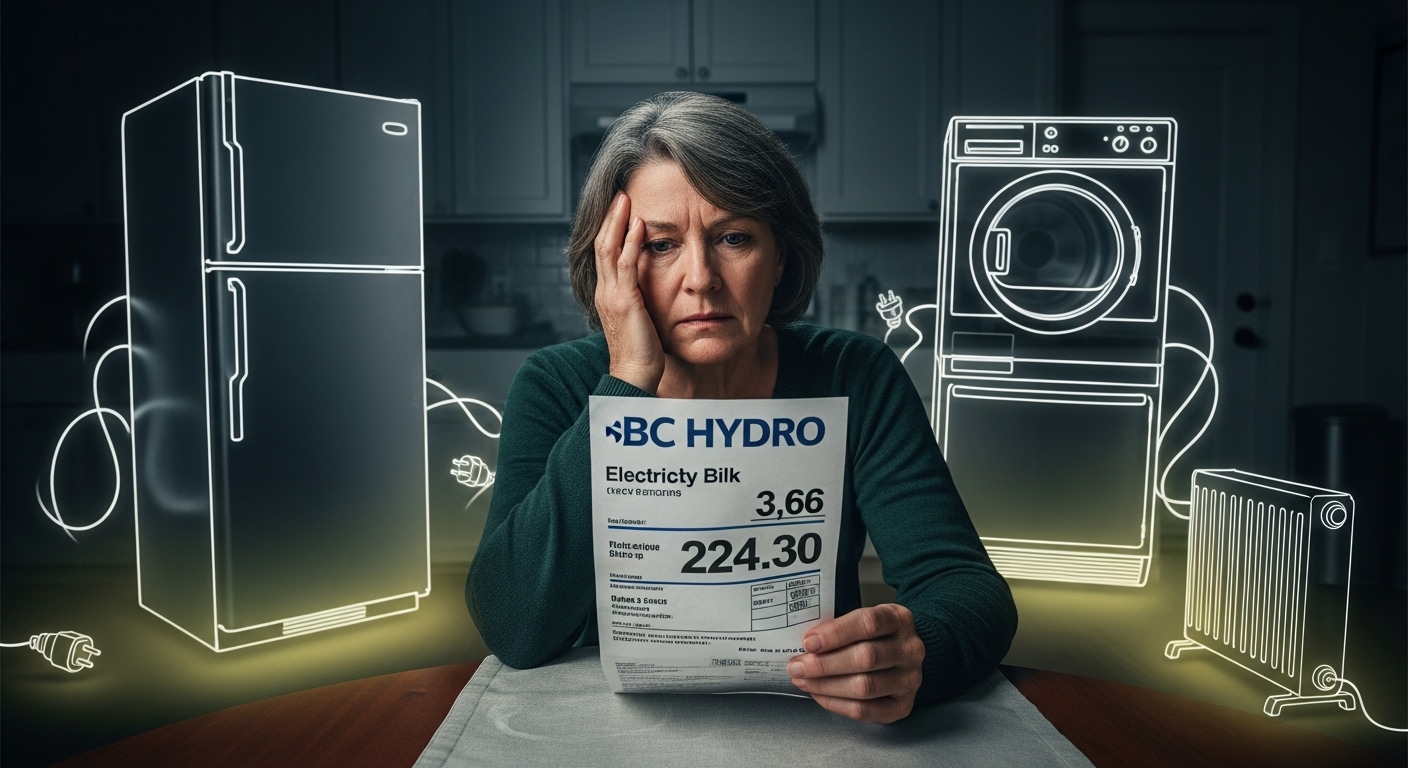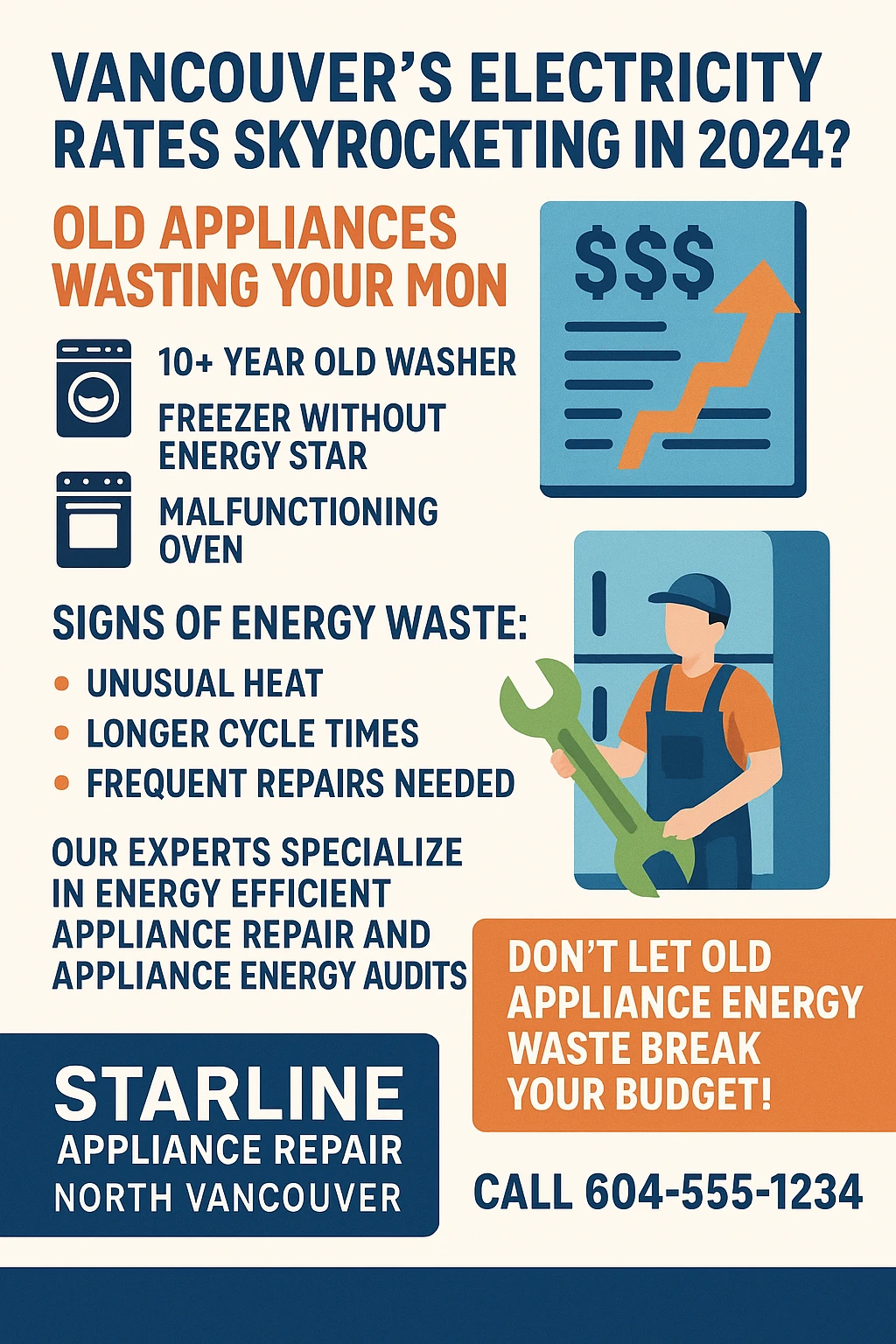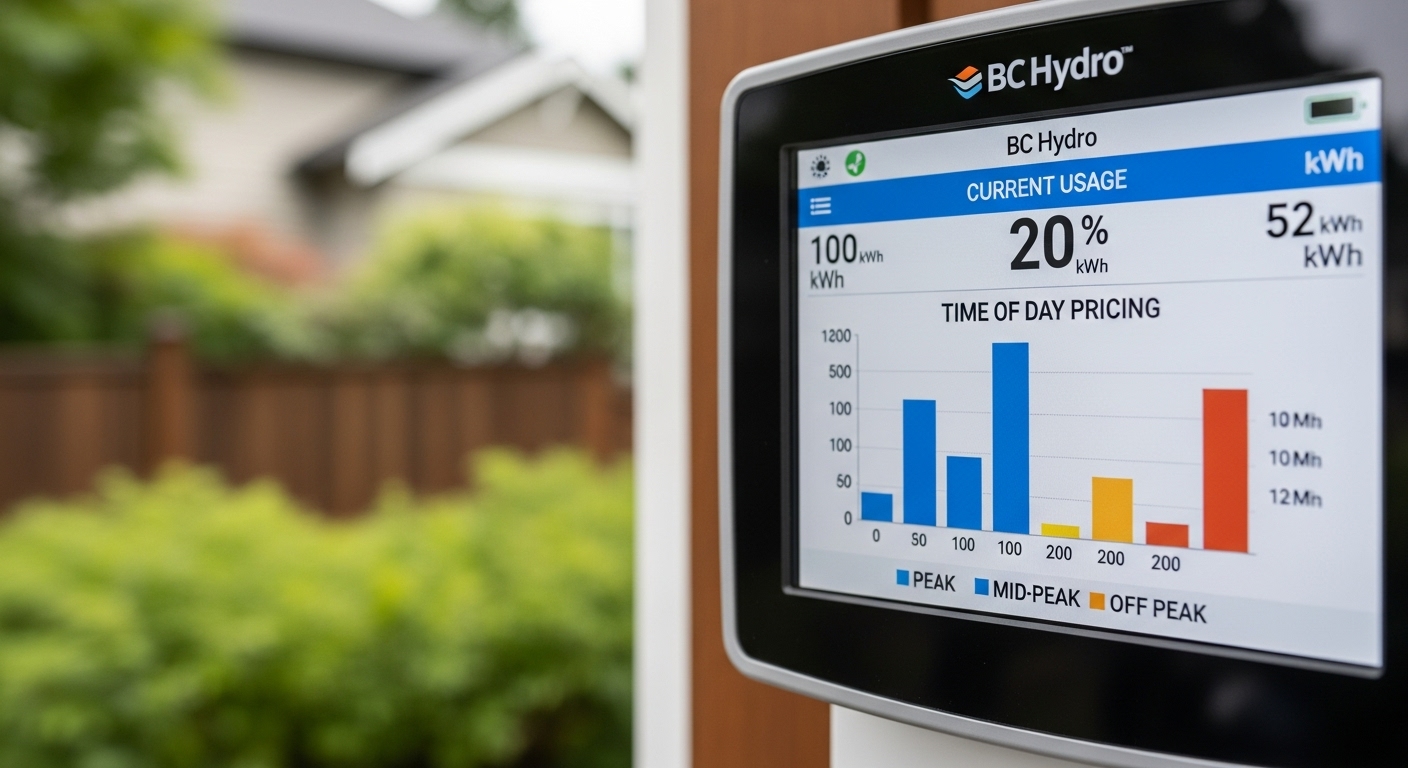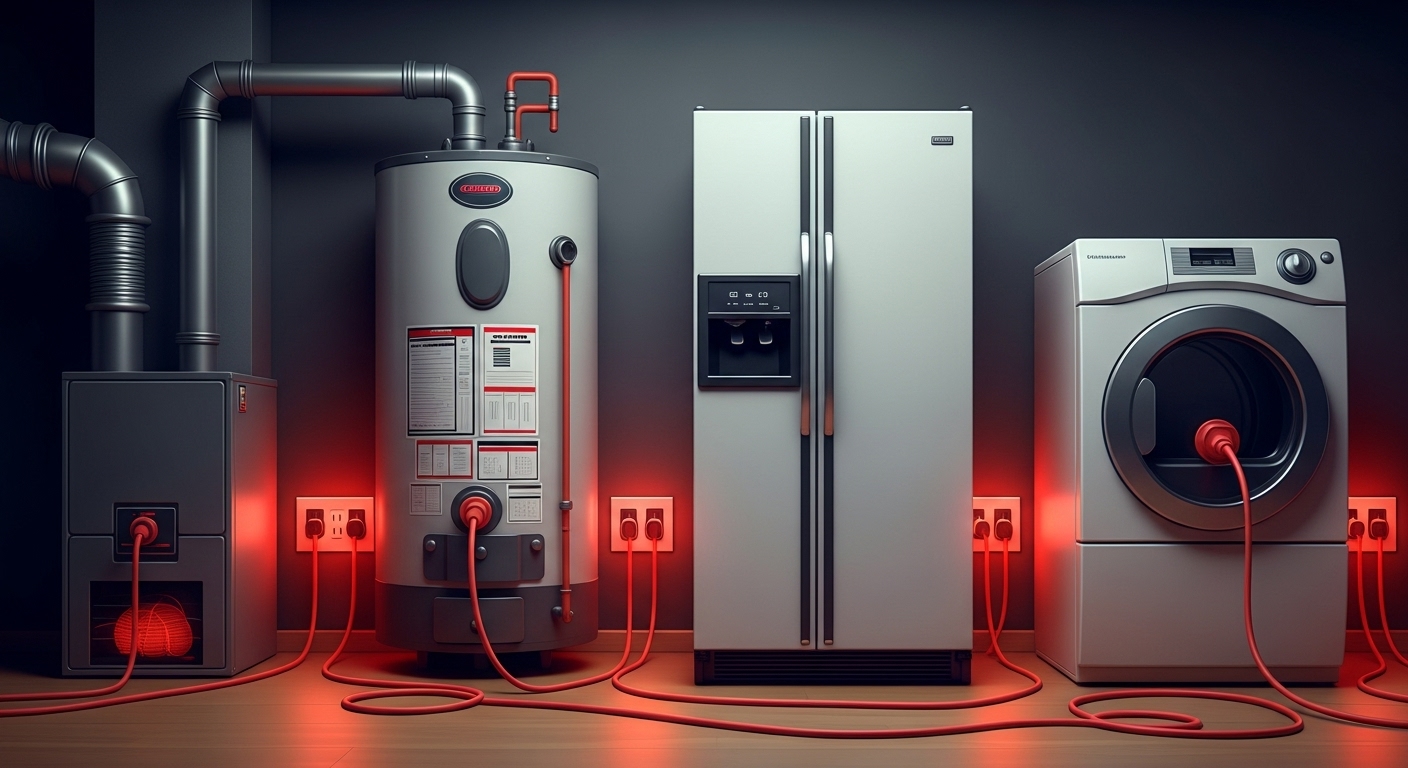How Vancouver’s Skyrocketing Electricity Rates Are Making Energy-Inefficient Appliances Cost You Thousands: A Homeowner’s Guide to Identifying Power-Hungry Appliances Before Your Next BC Hydro Bill Shock
Dealing with sky-high BC Hydro bills that seem to climb every month? You’re not alone – Vancouver homeowners are discovering that old, inefficient appliances combined with rising electricity rates create a perfect storm of unnecessary costs that can add up to thousands of dollars annually.
If you’ve been scratching your head over your latest electricity bill, wondering where all those extra dollars went, the culprit might be hiding in plain sight. Your trusty old refrigerator from the 90s, that faithful clothes dryer, or even that seemingly innocent coffee maker could be silently draining your bank account month after month. With BC Hydro’s recent rate changes and new pricing structures introduced in 2025, the cost difference between running efficient versus inefficient appliances has never been more dramatic.
Vancouver’s unique coastal environment makes this problem even worse. Our salt air and humidity don’t just give us those gorgeous sunsets – they also accelerate appliance wear and force your machines to work harder than they would in drier climates. When you combine aging, overworked appliances with electricity rates that keep climbing, you’re looking at a recipe for serious budget shock. The good news? Once you know what to look for and how to tackle these energy vampires, you can take control of your electricity costs and start saving hundreds or even thousands of dollars each year.

This isn’t just about swapping out a lightbulb or two. We’re talking about a comprehensive approach to identifying the biggest energy wasters in your Vancouver home, understanding how our local climate affects appliance efficiency, and making smart decisions about when to repair versus replace those power-hungry machines. Whether you’re dealing with phantom loads that cost you hundreds annually or trying to figure out if that 15-year-old refrigerator is worth keeping around, this guide will give you the tools and knowledge you need to slash your electricity bills without sacrificing comfort.
Key Outtakes
- Old appliances from the 1990s can cost Vancouver homeowners $84+ annually per appliance to operate versus $55 for modern Energy Star models, with the cost gap widening due to recent BC Hydro rate increases
- Phantom power consumption from always-on appliances accounts for up to 10% of your electricity bill, costing the average Vancouver household $100-300+ annually in unnecessary utility expenses
- Vancouver’s coastal climate accelerates appliance wear by approximately 20%, requiring more frequent maintenance and potentially shorter replacement cycles compared to drier inland areas
- BC Hydro’s new flat rate option introduced in April 2025 provides alternatives to traditional tiered pricing, but your appliance efficiency determines whether you’ll actually save money on any rate plan
- The 50% repair rule offers clear guidance for replacement decisions: if repair costs exceed half the price of a new appliance, investing in an energy-efficient model typically saves more money long-term

Understanding BC Hydro’s 2024-2025 Rate Changes and What They Mean for Your Appliance Costs
The landscape of electricity pricing in Vancouver changed significantly when BC Hydro introduced new rate options that give homeowners more control over their energy costs. However, these changes also mean that the efficiency of your appliances now plays an even bigger role in determining your monthly bills. Understanding these new rate structures is crucial for making smart decisions about your home’s energy consumption and appliance upgrades.

BC Hydro now offers residential customers three distinct pricing options: the traditional tiered rate, a new flat rate introduced in April 2025, and time-of-day pricing that can be combined with either structure. The tiered rate system charges a lower price for electricity up to a certain threshold, then a higher price for consumption above that amount, making it ideal for households with average or lower electricity usage. The flat rate provides a fixed price per kilowatt-hour that doesn’t change regardless of how much electricity you use, which can benefit households with high energy consumption from older, less efficient appliances.
Time-of-day pricing adds another layer of complexity and opportunity for savings. This system charges the highest rates during evening peak hours when demand is highest, moderate rates during the day, and the lowest rates overnight when most people are sleeping. For Vancouver homeowners with flexible schedules, this pricing structure offers significant savings potential by shifting major appliance usage to off-peak hours. Running your dishwasher, washing machine, or dryer overnight can result in substantial monthly savings, especially when combined with the flat rate option.
The introduction of these rate options comes at a time when electricity prices have been on a steady upward trajectory. According to BC Hydro’s electric power selling price index, monthly rate data shows consistent increases from the early 1980s to present, with recent years seeing more dramatic jumps. This upward trend means that the cost difference between running efficient and inefficient appliances has widened considerably. What might have cost you $50 annually in wasted electricity from an old appliance now costs $65-70 or more with recent rate increases, making appliance efficiency more important than ever for your household budget.
For Vancouver homeowners trying to decide which rate structure works best for their situation, the key lies in understanding your household’s energy consumption patterns and appliance efficiency levels. If your home is filled with older, energy-hungry appliances, the flat rate might provide some relief from tiered pricing penalties. However, the real savings come from addressing the root cause of high consumption by upgrading to more efficient models or implementing smart usage patterns that take advantage of time-of-day pricing opportunities.
The Top Power-Hungry Appliances Costing Vancouver Homeowners the Most
Every month, certain appliances in your Vancouver home are quietly consuming massive amounts of electricity, often accounting for the majority of your BC Hydro bill. Understanding which devices are the biggest culprits helps you prioritize your energy-saving efforts and identify where upgrades or changes in usage patterns can deliver the most significant savings. The reality might surprise you – it’s not always the appliances you think that are costing you the most money.

Heating and cooling systems dominate household energy consumption, typically accounting for 43% of your total electricity usage. In Vancouver’s climate, this means your heat pump, baseboard heaters, or air conditioning units are working harder during our notorious wet winters and surprise heat waves. The challenge for Vancouver homeowners is that our temperature swings and high humidity levels force these systems to cycle more frequently than in more stable climates. A simple adjustment like keeping your thermostat at 20°C instead of 22°C can reduce your heating costs by approximately 5% per degree, but aging or poorly maintained HVAC systems can easily waste hundreds of dollars annually in unnecessary energy consumption.
Water heaters represent the second-largest energy drain in most Vancouver homes, consuming 14-25% of your household electricity and often using 400 kWh per month. The type and age of your water heating system dramatically impacts these costs. Traditional tank water heaters, especially older models, maintain hot water 24/7 whether you’re using it or not, while tankless systems heat water on demand but may have higher upfront costs. Vancouver’s hard water in areas like Richmond and Burnaby compounds the problem by causing mineral buildup that reduces heating efficiency over time, forcing your system to work harder and consume more electricity to achieve the same results.
Clothes dryers might only represent 3.2% of overall home energy consumption nationally, but in Vancouver’s wet climate, these appliances become essential rather than optional for much of the year. The average dryer consumes between 1,800-5,000 watts during operation, with most models using around 3,000 watts per cycle. For a typical 45-60 minute drying cycle, you’re looking at 2,250-3,000 watt-hours of consumption per load. Vancouver families who can’t rely on outdoor drying for several months each year often find their dryers running daily, making this seemingly small percentage of energy use add up to significant costs on monthly bills.
Refrigerators and freezers might only account for 4% of household energy individually, but their 24/7 operation means that even small inefficiencies compound into major expenses over time. Old refrigerators from the 1990s can cost $84+ per year to operate compared to $55 for modern Energy Star models – a difference of nearly $30 annually that adds up to hundreds of dollars over the appliance’s remaining lifespan. BC Hydro recognizes this waste and offers a $30 buyback program for spare refrig

